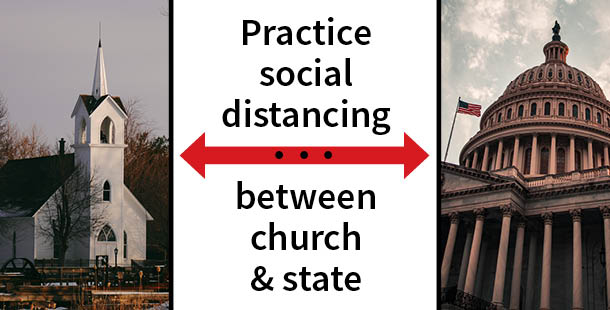
Cease starting your meetings with a prayer, the Freedom From Religion Foundation is asking a North Carolina city council.
A concerned King resident has informed the state/church watchdog that the King City Council has appointed a rotation of five chaplains to deliver prayers at the beginning of council meetings. These chaplains are reportedly all Christian; no one else is allowed to deliver prayer at City Council meetings. The FFRF complainant says that a request to deliver an opening invocation has been denied. Due to the fact that only Christian chaplains are allowed to deliver the prayers, such prayers are invariably Christian (including statements like “in Jesus’ name we pray,” etc.). For instance, in January of this year, Chaplain Paul Norman delivered this opening prayer:
Let us pray. … Heavenly Father, these are Your servants, we are Your servants. We call upon You to give us mercy and grace. Give us wisdom to make decisions that will bring our city into the future in a great way. We pray, Lord, that each and every one here would know that Jesus Christ is their savior. For we know, Lord, that the wrath is coming upon those who do deny Him, and we pray, Lord, that Your mercy and grace will ascend and be with each and every one here that might have comfort and peace in this time of … turmoil. … In Jesus’ holy name we pray. Amen.
Prayer at government meetings is unnecessary, inappropriate and divisive, FFRF emphasizes.
“Precedent from the 4th U.S. Circuit Court of Appeals, which has jurisdiction over North Carolina, prohibits government-sponsored prayer of the sort practiced at the city council’s meetings, where ‘a seat of government [wraps] itself in a single faith (Lund v. Rowan County, N.C., 2017),’” to quote the decision, FFRF Staff Attorney Chris Line writes to Mayor Jack Warren. “In Lund, the Rowan County Board of Commissioners opened each session with a prayer led by a board member that was invariably Christian, often featuring sectarian references that ‘implied that Christianity was superior to other faiths.’ The 4th Circuit declared that the board’s prayer practices violated the Establishment Clause because the board ‘elevated one religion above all others and aligned itself with that faith.’”
The King City Council’s practice has created a situation very similar to the one in Lund, FFRF points out. While the prayers are not led by City Council members, they are led by Christian chaplains appointed by the council, and the prayers are invariably Christian and often include sectarian references.
As importantly, the prayers exclude the 24 percent of Americans who are not religious. Citizens, including King’s nonreligious citizens, are compelled to come before the City Council on important civic matters. It is coercive and intimidating for these nonreligious citizens to come to a public meeting and be required to either make a public showing of their nonbelief or show deference to a religious sentiment they do not believe in, but which their City Council members clearly do.
FFRF urges the King City Council to concentrate on civil matters and leave religion to the private conscience of each individual by ending the practice of hosting prayers at the City Council’s meetings. At the very least, the City Council must ensure that its invocation policy does not discriminate against atheists and other non-Christians.
“A city council is not a church and it shouldn’t be necessary to seek divine help when making decisions over terrestrial matters such as sewers, liquor licenses and variances,” says FFRF Co-President Annie Laurie Gaylor. “A city needs to be truly welcoming of each and every one of its residents.”
The city has recently replied to FFRF’s complaint in a response that further muddies the waters.
“Since August 2018, public meetings have utilized city paid (or volunteer) chaplains on a rotating basis to provide invocations,” the city attorney states in an email. “We will evaluate invocation practices and likely reach out to the Alliance Defending Freedom for Faith and Justice [a Christian Right group] to review city practices and make suggested changes to be compliant with relevant laws.”
FFRF has also sent another recent letter to the mayor objecting to the city’s official support for the National Day of Prayer proclamation.
The Freedom From Religion Foundation is a national nonprofit organization with more than 35,000 members and several chapters across the country, including over 800 members and a chapter in North Carolina. Its purposes are to protect the constitutional principle of separation between state and church, and to educate the public on matters relating to nontheism.

